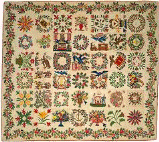Textile Society of America

Textile Society of America: Symposium Proceedings
Date of this Version
9-2012
Document Type
Article
Citation
Published in Textiles and Politics: Textile Society of America 13th Biennial Symposium Proceedings, Washington, DC, September 18- September 22, 2012.
Abstract
Navajos, or Dine', were dramatically affected by rapid changes in two of the three largest post- Civil War domestic industries: agriculture and textiles. In my 2010 TSA paper, I revealed how changes in the wool tariff triggered an escalation in textile production by thousands of Navajo weavers, as traders sought ways to market the unstandardized wool clip. Another under researched aspect of Navajo history concerns how the federal government's haphazard attempts in up-breeding Navajo flocks to national market standards triggered a failed development policy, resulting in the reduction of one-half their livestock during the Depression. For sixty years the government restricted traders from purchasing breeding stock in order to ensure Navajos' self-support. This proscription coupled with a lack of price supports for purchase of non-breeding stock to relieve overcrowding, resulted in an overgrazed range. Thus, conflicting government policies culminated in stock reduction which targeted churros, the coarse-woolled breed preferred by spinners and weavers. Weisiger (2009) reveals how this centerpiece of John Collier's conservation reforms failed because Navajo women, owners of all of the goats and most of the sheep, were shut out of the political process. Many Dine' resisted up-breeding since churros have resilient characteristics lacking in other breeds. Given women's high status traditionally, as reflected in their Creation narratives and matricentered social geography, Navajos' relational ontology incorporates k'e, networks of reciprocity encompassing the non-human world. These networks persist, as revealed in the film Weaving Worlds, confirming how the empirically based ecological understandings of Dine' are intimately tied to their social structures.


Comments
Copyright 2012 by the author(s).